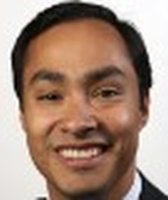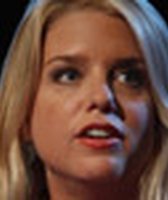Stand up for the facts!
Our only agenda is to publish the truth so you can be an informed participant in democracy.
We need your help.
I would like to contribute
Joaquin Castro says Donald Trump defended World War II internment camps
U.S. Rep. Joaquin Castro, D-Texas, used his speech on the final night of the Democratic National Convention to share the story of his grandmother, an immigrant from Mexico.
His grandmother didn’t always feel welcome in the United States, he said, but she believed her sacrifices would pay off with opportunity for herself and her family — much like immigrants from other countries.
"This room is filled with many proud Americans who can tell similar stories about their own families. Great-grandchildren of Irish immigrants who came to cities like New York and Boston and saw signs that read 'No Irish Need Apply' and just worked harder," Castro said. "Grandchildren of Americans who suffered in World War II internment camps — the same camps that Donald Trump has defended — and grew up to be business owners, war heroes, and public servants. Children of immigrants who have contributed to our country as doctors, police officers, and — guess what — even impartial judges."
Castro’s jab at Trump caught our attention. Did he really defend internment camps during World War II?
Trump did not explicitly defend the internment camps. But he made a lot of people think along those lines by not outright condemning the World War II detention of Japanese Americans during multiple interviews.
Trump has said he needed to be there to truly say.
We reached out to Castro’s team for more information on that statement, but did not hear back. Trump’s campaign also did not respond by deadline.
‘Racial prejudice, wartime hysteria’
Amid fears about national security after the Dec. 7, 1941, Japanese attack on Pearl Harbor, President Franklin D. Roosevelt issued several executive orders, including Executive Order 9066.
The order was to remove people of Japanese ancestry (citizens and immigrants) outside the Pacific military zone. About 120,000 people (including many who were native-born U.S. citizens) were placed in internment camps. Some were detained for up to four years in remote camps surrounded by barbed wire and armed guards.
The United States did not formally apologize for the internment camps until 1988, when President Ronald Reagan signed the Civil Liberties Act, which said the World War II actions toward Japanese Americans "were motivated largely by racial prejudice, wartime hysteria, and a failure of political leadership."
"The experience of mass imprisonment devastated the Japanese American community," said Eric L. Muller, Dan K. Moore Distinguished Professor at the University of North Carolina School of Law, who has written books about Japanese Americans during World War II.
"The financial losses were vast. Families were torn apart both emotionally and physically," Muller said by email. "A stigma and shame attached to the community that it took decades to shake."
Trump’s comments on internment camps
Seventy-four years to the day of the Pearl Harbor attack, Trump made his first call to ban Muslims from entering the country.
"Donald J. Trump is calling for a total and complete shutdown of Muslims entering the United States until our country’s representatives can figure out what is going on," his statement read, citing (shaky) research that "there is great hatred towards Americans by large segments of the Muslim population."
This idea was, and has continued to be, very controversial.
Asked about the ban the next day on Good Morning America, Trump defended his proposal by comparing it to the actions of Roosevelt, "one of the most highly respected presidents."
"What I'm doing is no different than FDR," Trump said.
ABC’s George Stephanopoulos asked Trump, "I take it you are praising the setting up of internment camps for Japanese during world War II?"
Trump repeated, "No, I’m not."
A similar back and forth occurred on MSNBC that morning when host Joe Scarborough asked Trump, "You certainly aren't proposing internment camps, are you?"
"I am not proposing that," Trump said. "It was tough stuff, but it wasn't internment. We're not talking about the Japanese internment camps. No, not at all. But we have to get our head around a very serious problem, and it's getting worse."
Also on Dec. 8, Time magazine reported that Trump had waffled on internment camps in a recent interview.
Trump told Time that he "would have had to be there at the time" to give a proper answer on whether he would have supported or opposed the internment of Japanese Americans.
"I certainly hate the concept of it. But I would have had to be there at the time to give you a proper answer," Trump told Time. He continued to tell the magazine that wartime sometimes requires tough decisions.
A week later, the Japanese American National Museum in Los Angeles, Calif., issued a statement cautioning against provocative rhetoric deliberately provoking fear "of any one group."
"To cite the unlawful incarceration of Japanese Americans during World War II as an appropriate action and one that could be emulated today is to completely misunderstand that shameful chapter of history," the museum said.
On March 27, ABC’s Jonathan Karl asked Trump if he would "rule out" the idea of internment camps for American Muslims, noting that Trump had not proposed internment camps.
"I would rule it out, but we would have to be very vigilant," Trump said. "We're going to have to be very smart. We're going to have to be very rigid and very vigilant. And if we're not very, very strong and very, very smart, we have a big, big problem coming up."
Since announcing the Muslim ban in December, Trump has slightly shifted his position, telling the Wall Street Journal in June that instead he would temporarily suspend immigration from "regions that have been a major source for terrorists and their supporters."
Our ruling
Castro said Trump has defended World War II internment camps.
Trump likened his proposed Muslim ban to how Roosevelt handled World War II. When pressed by journalists if he supported the internment camps for Japanese Americans under Roosevelt’s order, Trump said he was not praising that exactly.
In another interview, Trump said he hates the "concept" of internment camps, but "would have had to be there at the time to give you a proper answer" on whether he supported or opposed Roosevelt’s action.
So Trump’s comments are not as specific as Castro claims, but Trump never mounted an affirmative defense. Sometimes he declined to defend them, other times he has said he would have had to be present when the internment camps were in use. We rate the claim Half True.
https://www.sharethefacts.co/share/4e626cbf-8ee1-4b41-b0a5-3073c0fd45f8
Our Sources
Rep. Joaquin Castro, speech at the Democratic National Convention, July 28, 2016
PolitiFact, Debbie Wasserman Schultz wrongly says Marco Rubio called for internment of Muslims, Dec. 10, 2015
Time, Exclusive: Donald Trump Says He Might Have Supported Japanese Internment, Dec. 8, 2015
National Park Service, Dec. 7, 1941 losses
National Archives, Teaching With Documents: Documents and Photographs Related to Japanese Relocation During World War II
Japanese American National Museum, Statement Regarding Recent Remarks about the Incarceration of Japanese Americans during World War II, Dec. 15, 2015
Email interview, Eric L. Muller, Dan K. Moore Distinguished Professor at the University of North Carolina School of Law
National Archives, Executive Order 9066
ABC, Donald Trump speaks out on plan to ban Muslims, Dec. 8, 2015
ABC, 'This Week' Transcript: Donald Trump and Sen. Bernie Sanders, March 27, 2016
MSNBC, Trump defends Muslim ban as ‘common sense’, Dec. 8, 2015
PBS, The War
NPR, From Wrong To Right: A U.S. Apology For Japanese Internment, Aug. 9, 2013
Text of Civil Liberties Act of 1988
New York Times, Day of Apology and 'Sigh of Relief’, Aug. 11, 1988
PolitiFact, Trump cites shaky survey in call to ban Muslims from entering US, Dec. 9, 2015
Donald Trump campaign website, Donald J. Trump Statement on preventing Muslim immigration, Dec. 7, 2015
Browse the Truth-O-Meter
More by Miriam Valverde
Joaquin Castro says Donald Trump defended World War II internment camps
Support independent fact-checking.
Become a member!
In a world of wild talk and fake news, help us stand up for the facts.












































